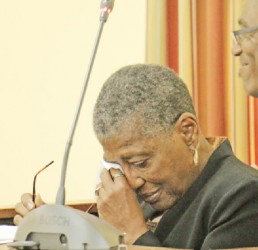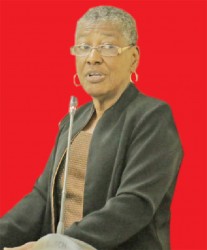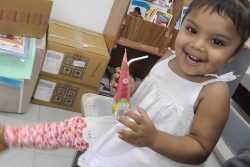Despite being faced with extreme harassment and the murder of close friends, Walter Rodney was not driven to violence, according to his widow Dr Patricia Rodney, who also testified yesterday that she had never heard of any links between her husband and guns for 30 years.
At the beginning of the sixth session of the Commission of Inquiry (CoI) into the June 13, 1980 death of Walter Rodney, his wife took the stand at the Supreme Court Law Library and maintained that her husband was not a violent man, no matter the situation he found himself in. She further explained that he was never aggressive or argumentative in the face of difficulties or danger.
Patricia Rodney was slated to continue her testimony until 2pm yesterday but was forced to leave the stand an hour earlier after she broke down – for the second time – as she described life after her husband’s death. Though she tried to speak through the tears, the woman’s voice was noticeably breaking; she eventually took a seat before Chairman of the commission Sir Richard Cheltenham called for a recess. Her son, Shaka Rodney made his way to his mother and offered her a hug as she wiped her eyes.


“One minute somebody’s alive and the next minute he’s dead and we know death is inevitable but it’s the horrific way that he was killed; even now it’s hard talking about it,” Patricia said before continuing, “But I always thought that whatever I was doing and the decisions I was making, Walter was there; he’s always with me, present in my life. His presence is always there.”
Walter Rodney died after what was thought to have been a walkie-talkie that was given to him exploded near Camp and Bent streets in the vicinity of the Georgetown Prison.
The then-governing party the People’s National Congress (PNC), long accused of engineering his death, has repeatedly issued denials.
Attorney Andrew Pilgrim, who represents the interest of the Rodney family before the CoI, led Patricia Rodney through her evidence yesterday. He enquired whether she had heard reports of Walter allegedly being supplied with weapons. She admitted that she had – about 30 years after the distribution purportedly occurred.
“Until about four years ago, when a documentary was done… then in one of the interviews it says that the WPA was gathering arms and ammunition; that was the first time I heard about it,” Patricia said. She continued, “I have never seen a gun in my house; I have never seen Walter carry a weapon ever.”
Her declarations come in the wake of reports that Walter Rodney had been supplied with weapons for his political party, the Working People’s Alliance (WPA), in an attempt to overthrow the PNC.
Video:
In the documentary film “W.A.R. Stories: Walter Anthony Rodney” by Clairmont Chung, co-leader of the WPA Rupert Roopnaraine had admitted that the party had been accumulating weapons long before Rodney’s murder. “We were accumulating weapons… we were accumulating equipment of various kinds. A certain amount of that was coming from the military,” Roopnaraine said during one of the documentary’s interviews.
More recently, during testimony before the CoI, WPA member Tacuma Ogunseye said the party planned to overthrow the then PNC government in the late 1970s through a civil rebellion and attempted to win over the army as part of its efforts. He stated that the party started examining ways to overthrow then head of state Forbes Burnham, and set out to win over the military and prepared for the change by strengthening the WPA’s covert and overt activities.
However, Patricia stated that her husband had never been the type to employ violence even though he was quite aware of the danger his life had been in, particularly after the murder of two close friends. “I have never seen his temper,” she emphasised.
Harassment
Mrs. Rodney was further questioned on the pressures the Rodney household faced on the return to Guyana from Tanzania in 1974.
Following her husband’s first arrest, she said, his popularity grew and people offered their support. She further said that there was a noted growth in the number of attendees at political meetings organised by her husband.
“I remember as a student at the University of Guyana and I had gone to Linden with several lecturers from the university, and people identified me – I wasn’t aware – and people came over saying, ‘Oh, we’re so glad that Walter’s back and that he’s looking out for us’ and things like that,” Mrs. Rodney recalled.
However, she said, her husband was not interested in political office. “He felt that even if his party wanted power, he wanted to be there to be critical and analytical… to my knowledge, he never wanted to have any reins of power,” Patricia maintained.
According to Patricia, the family – which consisted of Walter Rodney, herself, and their three children, Shaka, Kanini and Asha – had experienced harassment which began subtly but grew in intensity as time went by.
Video:
“It was very subtle at first,” she said. She recalled one incident where a friend of the family, whose children would carpool with hers to school, broke off contact after receiving warnings to “stay away from the Rodneys.”
“Subsequently, we heard that he had been told to stay away from the Rodneys, that they were a bad influence; so eventually even the children stopped coming to play with my children.” She continued, “It became less subtle when our home was constantly searched; just out of the blue men in uniform, without uniform, would turn up in our home, claiming that they were looking for arms and ammunition.”
Mrs. Rodney went on to say that the continuous attacks even saw the family being constantly uprooted out of fear, something that particularly affected the young children. She explained that the Rodneys, including her parents, had been forced to move out of their homes following the threat of a bombing. She further said that the family had to be separated, with herself and Walter staying in different safe houses.
“My daughters stayed with relatives, my son stayed with friends, and Walter and I stayed at what were called safe homes or safe houses,” she said. She went on, “I never knew where the safe house would be at the time; we couldn’t stay at the same house every time, we had to be changing houses. So, somebody would offer their house and we would stay there.”
According to the widow, Walter had been conscious of the dangers in his life but had encouraged her to not let the fear stymie her. She explained that their goal was to have their children’s lives undisturbed and “as normal as possible”.
“It was getting quite scary… at one point we talked about me leaving Guyana and going to stay with friends at other places…there are only so many precautions we can take,” Patricia said before adding, “Walter always told me not to allow fear to make me a prisoner in my own home…He was very conscious of what was happening but he felt he had a commitment in doing the work he was doing by building the solidarity of the people in Guyana.”
According to Patricia, the harassment continued even after her husband’s death. She explained that on June 13, 1980 he had been scheduled to meet with Gregory Smith—the main suspect in his death—while she had been in attendance at an event with one of her daughters. She subsequently learnt from close family friend Father Malcolm Rodrigues that Walter had “been in an accident.”
After gathering up the children, she said, they made their way home, only to be visited shortly after by police officers. She further said that Walter’s parents had also been subjected to the same treatment and Edward Rodney, Walter’s brother, had been arrested.
The officers, she said, were apparently aware that Walter had been killed; however, they nevertheless questioned with a smile, “Where is your husband?”
Video:
She added that she had not been able to see Walter’s body for days following his death and it had taken even longer for it to be released.
Police presence was also high at her husband’s funeral, she said. According to Mrs. Rodney, there were many officers on site along with helicopters flying about. “I think they expected something to happen; a riot or something. But we were able to talk to the people, tell them that Walter would not want that…We didn’t want the government to use it as an excuse to slaughter people,” she said.
She further said the government had not been represented at the funeral.
Long overdue
Meanwhile, she be-lieves that the inquiry into her husband’s death should have occurred a long time ago.
“Since Walter’s death we’ve been calling for an inquiry,” the widow stated. “We always persisted that we needed to have the truth; I needed to heal, my children needed to heal and I think it would have been the best thing for Guyana that the people can heal.” She further said that she recognized that many persons were unable to move on because they had not been afforded the opportunity to heal.
According to Mrs. Rodney, the Rodney family had always been behind an inquiry into the historian’s death. She stated that, at one point, a statement had been publicly made by a high-ranking government official claiming that the Rodney family did not want an investigation into Walter Rodney’s death.
However, Patricia said that the claim had been “untrue” and far from the family’s needs.
“I’ve never abandoned it,” she emphasised. She further said that, in 2005, she had spoken to then President Bharrat Jagdeo who had indicated that he was pushing for an inquiry.





